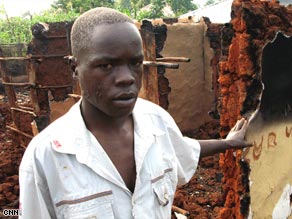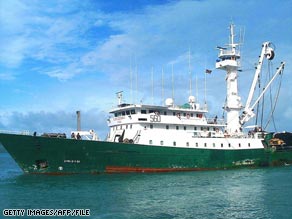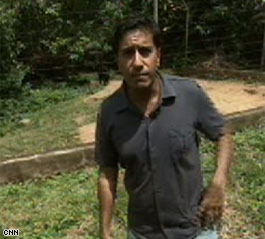 Henry Okah in a publicity picture released by Mend |
Little is known about Henry Okah, the Niger Delta militant currently being held by the Nigerian Government.
He has been accused by police of murder, kidnapping, bank robbery, gun-running and putting the state at risk by planning to secede the oil-rich delta region from Nigeria.
Now his brother has told the BBC about the early life of the man who helped turn a gang of unruly thugs into a well-publicised movement.
Charles Okah says they grew up in a privileged family who had no contact with the Delta until their late teens.
While Charles qualified as an engineer and went to work in the oil industry, Henry went deeper into "activism", fighting the oil companies.
 |  The way people were living we did not know people lived like that. The way people were defecating in the water they drank The way people were living we did not know people lived like that. The way people were defecating in the water they drank  |
Henry's first real steps toward the rebels came in the 1990s when Henry got a job selling licensed guns to Lagos home-owners.
He got the licences from the police, Charles says, and claims it was a legitimate business.
He denies any knowledge of where the guns came from, but at the time Henry had been working for the Nigerian merchant navy for some years.
"Like any business in Nigeria, he saw an opportunity and had a connection," Charles said.
Henry was a successful salesman because he'd paint a graphic picture of what happened during an armed robbery and customers would hand over the cash.
"He even sold me a gun," his brother says, "I didn't want one but he said: can you imagine an armed robber raping your wife?"
"Nervous guys who didn't want anything to do with guns would change their minds in an instant when he said that. We'd laugh about it."
Now his brother has been extradited from Angola on gun-running charges.
Whereabouts unknown
Mr Okah, 42, has not been seen since arriving back in Nigeria last week.
Mend said they heard he was killed by security forces, prompting a denial by the government.
His lawyers filed papers in an Abuja court Thursday in an attempt to have him charged or released.
Mr Okay's family and lawyers deny Henry is a violent militant. They say he's an "activist", who has a day job as a marine engineer and "import and exporter".
Observers say that with Okah's media-savvy guidance, Mend transformed itself from a band of poorly organised thugs into a operation that had well organised propaganda and appeared to have a political mission.
They notified journalists of attacks moments after they occurred, and emailed pictures of hostages to newsdesks around the world.
Privileged upbringing
Its a far cry from when Henry and Charles were growing up in privileged Lagos society.
The children of a successful Navy officer, they lived among the wealthy elite of early post-independence Nigeria.
Charles remembers a very "British" upbringing.
 | MEND Formed early 2006 Had links to militant Mujahid Dokubo-Asari's Niger Delta Volunteer Force Split into two rival groups late 2006 Bayelsa State faction leader - Jomo Gbomo Delta State faction leader - Gen Godswill Tamuno Demand 100% control of Nigeria's oil wealth Demanded release of impeached Bayelsa governor on trial for money laundering Operate from creeks of Niger Delta Communicate with media by e-mail |
They went to private schools, and had never visited their family village in Bayelsa state, where the oil industry was then developing.
Henry, The fourth of nine children, enjoyed adventure comics and read Commando magazine, according to older brother Charles.
"We would talk about battles in the second world war endlessly. We loved war films and talked about them all the time," he said.
But when it came down to it neither of the brothers followed his father into the military.
"He and father had a kind of running battle," Charles said "Henry has always been very brave and headstrong."
Good at literature as well as working with his hands, Henry had many offers from universities but chose to go to nautical engineering college and into the merchant navy.
"I was always the quieter brother, Henry was the adventurous one," Charles said.
Charles himself went from engineering college to work for a company making floating docks for the oil industry.
It may seem ironic that the brothers would end up on different sides of the divide, but in Nigeria the oil industry is one of the only areas of employment for educated middle-class graduates.
Political awakening
It was not until Henry was 19 and their mother died that they visited their family home in the creeks of Bayelsa.
Henry told his brother how shocked he was at the living conditions they saw when they arrived in the family home of Ammasoma.
"The way people were living we did not know people lived like that. We felt advantaged as children. He began feeling upset about it, the way people were defecating in the water they drank," Charles said.
 Poverty and unemployment is high in the Niger Delta |
The execution of Delta activist Ken Saro Wiwa by Nigeria's military government in 1995 affected Henry very badly, his brother said.
"We were living in the same area then. It was very depressing for him. Really Ken Saro Wiwa set the standard that he tried to surpass."
But government sources balk at the comparison with Saro Wiwa, who has become a byword for the struggle of the little man against powerful interests.
They say Mr Okah is an international arms dealer who has used guns to get control of a group of criminals, and exploited the situation for his own means.
The Police on Thursday said he was being interrogated about murders, kidnappings, bank robberies, in addition to the accusations of gun-running.
"Surprise"
But Charles Okah says he is surprised at some of the things he reads in the papers about his brother.
Since 2003, Henry has lived in South Africa with his wife and four children. Charles claims he has no knowledge of what his brother has been doing.
"I read about these things and if they are true I am surprised. It means that Henry disguised his passion even from us."
"Our background is in contrast to those guys. It's frightening. I knew he had this courage but if it is true, he commanded the respect of these people who are very tough."
Charles attributes his brother's apparent ability to bridge the gap between him and hardened militants to his being a "nice person" who "doesn't judge people or look down on them."
Arrest
Charles spoke to his brother just before he was arrested in Angola in September.
Interpol says Okah and a friend, Edward Atatah -a captain in the merchant navy- were buying explosives in Angola when they were stopped.
But Charles says they were there to buy a second hand trawler for Okah's marine engineering consultancy.
"He called me and said they were being delayed on the way in and their passports were checked. He worried they were being set up," Charles said.
He added Henry was "travelling on his real passport" because he had been visited by top-ranking members of the government in August and believed there was nothing to fear.
But then he denied Henry ever had a false passport.
The way Charles talks, it is clear he knows his brother was deeply involved with militancy.
He knew Henry was being hunted by the security services over a year ago, when Henry turned up unannounced at their father's funeral.
"He comes and goes, I don't know how," he says.
What now?
Charles clearly does not believe his brother is dead. He brightens up when he says "You will see him very soon. I'm sure you will like him."
Even if he is still alive, it is unlikely he will be released on any kind of bail.
The effect on the Delta of taking Okah out of circulation is unclear.
His arrest and the mystery around his current whereabouts has heightened tension there.
But security analysts say the future is bleak anyway.
"The saturation of small arms around the Niger Delta means that kind of criminality will continue. What is needed is to remove some of these groups reason d'être," said Security consultant Tony McClenaghan.

![]() Watch Bosire describe her die »
Watch Bosire describe her die »



















